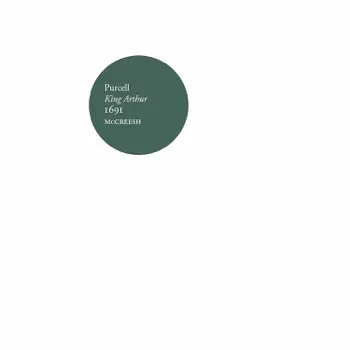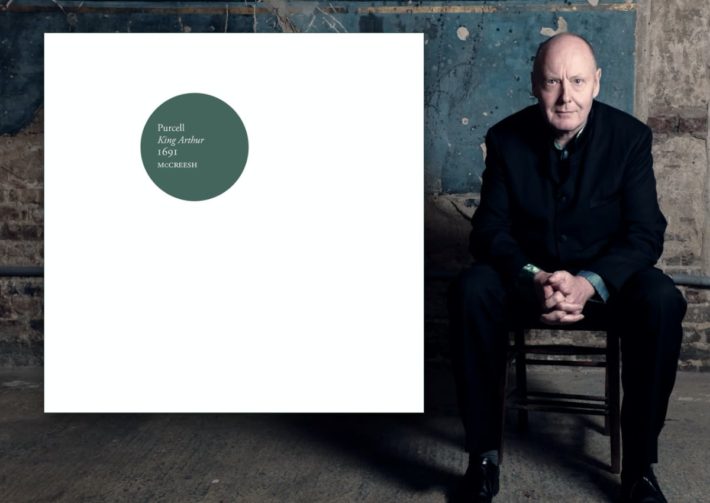Purcell’s King Arthur has something for every age of classical music listeners. It has triumphal trumpet tunes that will appeal to the youngest of ears, romantic and naïve arias for love-struck teens, reflections on love and marriage for those in mid-life, and enough serious music in between that even the most weathered listeners will find something new and appealing. Never have these qualities of the opera been made more clear than in Paul McCreesh and the Gabrieli Consort’s new recording of the work.

Gabrieli’s singers have an enchanting hold on the text, especially in Act 1, which features the opera’s most memorable choral numbers as King Arthur and his Britons face off against the Saxons. The group has been performing King Arthur for years, and have the score beyond memorized. Listen to the infectious rapture in “I Call You All…” (track 10), the bold joy in “Come If You Dare” (track 11), the ceremony in “We Have Sacrificed” (track 7). The soloists’ interpretations are rich and full of illustrations. “Hither This Way” (track 15) is very effective, almost frightening — listen to the stereo effects, how the tenors call you one way and the sopranos another.
Acts 2 through 4 of the opera turns to the more mature themes of love and seduction, as various enemies try to tear apart Arthur and his fiancée Emmeline. The set of shepherd’s songs (“How Blest Are Shepherds”, track 17), “Shepherds, Leave Decoying” (track 18), and “Come, Shepherds…” (track 19) are full of wordplay and implication, and McCreesh et al capture that spirit well. Their choice to use a trimmed-down continuo (no strings) in solo moments is especially apt here. Accompanied only by plucked instruments, the singers are free to use a lighter tone, and to change moods on a dime — listen to the final lines of “How Blest Are Shepherds” and you’ll hear James Way move gracefully from expectant to admonishing to wistful. The sopranos, Mhairi Lawson and Anna Dennis, ring out clearly, appropriately fed-up and determined in “Shepherds, Leave Decoying.” Rowan Pierce is a convincing Cupid, blissful and slightly naïve (“Thou Doting Fool,” track 23). Ashley Riches is a truly abject, shivering Cold Genius, singing with the shivering strings (“What Power Art Thou,” track 22).
Given the excellence of the musical interpretations throughout the album, the few vocal shortcomings are noticeable. Way’s singing, and that of high tenor Jeremy Budd, will likely split opinions. Way’s tone sometimes suffers from his enthusiasm, like in “Come If You Dare,” yet his voice is full of emotion. Tenors Robert Buckland (for Vox Luminis) or Joseph Cornwell (for Le Concert Spirituel) strike a more steady balance. Budd occasionally strains in the high range, and sounds a bit indifferent in “How Happy the Lover,” but that may be the intention. High tenors Olivier Berten (Vox) and Cyril Auvity (Spirituel) seem more up to the challenge. Indeed, throughout, the ensemble singing of Gabrieli is not as polished and resonant, strictly technically speaking, as that of Vox, and not as forceful as that heard on Le Concert Spirituel’s version.
The instrumentals on the album, too, contribute to its enchanting quality. The overtures, airs, and accompaniment — all are played with skill and an ear to the singing that will follow. Everything sits within its place. The trumpet playing is especially pleasing; period trumpets provide a sweet tone (remarkably always in tune!), but are never overzealous. The Gabrieli strings eschew modern basses and celli for what are essentially oversized violins, and recently began experimenting with different bow-holds; these have inspired them to combine the orchestral instruments in lots of new combinations across the album, to great success. The variety of color worlds thus evoked is wonderful, and always appropriate for the current song. A skillfully engineered recording captures the orchestra, soloists, and choir with just the right balances. One notable omission on this album is the timpani — those looking forward to pounding drums will have to look to Vox or Le Concert Spirituel, and there will certainly not be disappointed.
As a director, McCreesh betrays no urge to create drama where there is none, and in a way, that is what allows the colors of the musicians to emerge. The performance is welcoming. Additionally, the album’s liner notes are educational, exhaustive, and refreshingly democratic: they feature performance notes from a Gabrieli singer, trumpeter, and harpsichordist, among other historical essays. As a whole, this release is a notable accomplishment and document of Gabrieli’s success. It is not the final word on Purcell’s King Arthur — but then again, who would ever want a final anything on such great music?
Purcell – King Arthur
Soloists: Anna Dennis, Mhairi Lawson, Rowan Pierce, Carolyn Sampson, Jeremy Budd, James Way, Roderick Williams and Ashley Riches
Gabrieli Consort & Players
Paul McCreesh – Conductor
Gabrieli, CD 635212058923




















